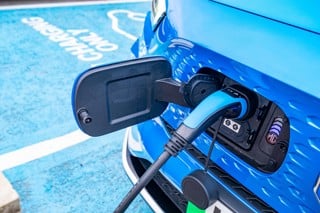The Government has announced in the Autumn Statement that benefit-in-kind (BIK) tax for electric vehicles (EVs) will continue to be kept low to increase uptake.
The Chancellor, Jeremy Hunt, said he had listened to the fleet industry and would increase company car tax for EVs by one percentage point year-on-year for three years from 2025.
Currently, BIK for a pure EV is 2% (2022/23) and remains at that rate up to April 2025. The Chancellor’s announcement means that it will increase to 3% in 2025/26, to 4% in 2026/27, and 5% in 2027/28.
Paul Hollick, chair of the Association of Fleet professionals (AFP), said: “We have been strongly expressing that the position of EVs in the UK fleet sector remains at a relatively early stage of adoption and the increases in company car taxation, of 1% percent per year, seems well-judged to us at first glance.
"Crucially, they will allow fleet decision makers to plan for the second half of the decade as they continue the process of electrification.
"This is something for which we have been campaigning in conjunction with BVRLA and it is to be welcomed."
Ashley Barnett, head of fleet consultancy at Lex Autolease, said that the publication of company car rates beyond 2025, "reaffirms" the Government’s commitment towards a greener future and gives decision makers the clarity they need to accelerate their transition towards EVs.
He added: "Fleet replacements typically operate in four-year-cycles and today’s announcement paves the way for future purchasing decisions – giving them the confidence they need to commit to a long-term sustainability plan.
"With longer lead times from manufacturers delaying the delivery of many vehicles, having clarity beyond 2025 is a major boost for future electric fleet decision making.”
The Government said that setting rates for company car tax until April 2028 would provide "long-term certainty" for company car drivers and rates would continue to incentivise the take-up of EVs.
It explained that the appropriate percentages for electric and ultra-low emission cars emitting less than 75g/km will increase by one percentage point in 2025-26; a further 1% in 2026-27 and a further 1% in 2027-28 up to a maximum appropriate percentage of 5% for electric cars and 21% for ultra-low emission cars.
Rates for all other vehicles bands will be increased by one percentage point for 2025-26 up to a maximum appropriate percentage of 37% and will then be fixed in 2026-27 and 2027-28.
The one percentage point year-on-year rise will be worth an additional £95 million to the Treasury in 2025/26, £155m in 2026/27 and £245m in 2027/28.
BVRLA Chief Executive, Gerry Keaney, added: “Today marks a key milestone in the UK’s transition to zero emission motoring and cements the momentum we have gathered in recent years.
"Our sector is the driving force behind getting cleaner, greener vehicles on UK roads, with the tax regime a critical lever in making it happen.
“Our #SeeTheBenefit campaign had clear asks around keeping rates low and giving drivers confidence in future rates.
"The Government has listened. We have engaged with MPs, the Treasury and the Chancellor directly, with our voice bolstered by input and letters from thousands of BVRLA members and industry professionals.
“Benefit-in-kind rates remaining fair, alongside the clarity provided by years of foresight, gives us a clear path on the road to net zero. The long-term health of the market has been boosted by today’s announcement.”
Ian Hughes, CEO of the corporate division at Zenith Vehicles, paid tribute to how the industry had campaigned to keep BIK low. “From trips to Westminster to speak with MPs to reaching out directly to Government officials, we’ve been committed to campaigning and educating Government on how pivotal Benefit-in-Kind tax is on the uptake of electric vehicles," he said.
“Following the Chancellor’s announcement, we’re thrilled that the work we’ve done in conjunction with the BVRLA has paid off, and Government is continuing to support and recognise the role fleet plays in its net zero ambitions.
“By setting appropriate BiK rates for the foreseeable future, we expect the current growth trends, of which nine out of 10 orders in our salary sacrifice order bank are electric vehicles, will continue as we support our customers on their sustainability ambitions.”
EVs to be subject to VED

Hunt also announced that EVs will be subject to vehicle excise duty for the first time.
He said that, reflecting the success of the transition to EVs, the government will introduce VED on electric cars, vans and motorcycles from April 2025.
"This will ensure that all motorists begin to pay a fairer tax contribution," he explained.
New zero emission cars registered on or after April 1, 2025, will be liable to pay the lowest first year rate of VED (which applies to vehicles with CO2 emissions 1 to 50g/km) currently £10 a year.
From the second year of registration onwards, they will move to the standard rate, currently £165 a year. Zero emission cars first registered between April 1, 2017, and March 31, 2025, will also pay the standard rate.
The Expensive Car Supplement exemption for EVs is due to end in 2025. New zero emission cars registered on or after April 1, 2025 will therefore be liable for the expensive car supplement, says the Treasury.
The Expensive Car Supplement currently applies to cars with a list price exceeding £40,000 for five years. Zero and low emission cars first registered between March 1, 2001, and March 30, 2017, currently in band A will move to the band B rate, currently £20 a year.
Zero emission vans will move to the rate for petrol and diesel light goods vehicles, currently £290 a year for most vans.
Zero emission motorcycles and tricycles will move to the rate for the smallest engine size, currently £22 a year. Rates for alternative fuel vehicles and hybrids will also be equalised
Fuel duty and VED combined raise about £35 billion for Government coffers but, according to the Office for Budget Responsibility (OBR) the growing share of electric cars threatened to cut motoring tax revenues by £2.1bn by 2026-27.
By introducing VED on EVs, the Government estimates that it will be worth an additional £515 million in 2025/26, £985m in 2026/27 and almost £1.6bn in 2027/28.
Barnett said: “The electric vehicle market has grown exponentially in recent years, creating a shortfall in motoring tax revenue. However, when coupled with rising vehicle and electricity prices, we must remain cautious of introducing further barriers to adoption.
“The introduction of VED on EVs won’t immediately stall future uptake, but it does highlight the need for a more coherent and joined up conversation between Government departments and industry bodies to simplify what is becoming an overly complicated vehicle taxation system.
"Vehicle excise duty must operate in a fair, emissions-based way if we are going to continue to clean up the older and more polluting vehicles on the UK’s roads.”
Hollick added that VED equalisation with ICE – something that will apply to the vast majority of EVs from 2025/26 - was "disappointing" but perhaps not unexpected.
"It does feel a little as though the Government has given with one hand and taken some back with the other,” he added.
David Savage, vice president, UK and Ireland at Geotab, says it is "hugely disappointing".
"We’re just 8-years out from the cessation of internal combustion engine (ICE) powered cars in the UK and very much at the crux of the transition to electric," he said.
"Electric vehicles are currently exposed to a number of challenging external factors, from soaring electricity tariffs, higher VAT for public charging versus home, and increased list prices of the vehicles themselves. Despite this, the Government has responded by terminating the plug-in car grant incentive scheme for EVs—and now is introducing vehicle excise duty on electric cars for the first time.
"In the week of COP27, where the urgency of maintaining the 1.5C rise in global temperatures has been underlined, now is not the time to undermine the importance of the crisis we face, nor walk back the advances we’ve made as a country.
“We recently revealed that over half of light-duty fleet vehicles in Europe could save nearly £218 million simply by switching to electric today.
"However, this series of decisions from the Government is demonstrably stifling the economic viability of this transition. Moving forward, we hope to see more focused investment and support from the Government to accelerate the shift to electric ahead of its 2050 net zero ambitions.”
Karl Howkins, managing director of SOGO mobility, also believes the tax hike could threaten the switch to electric. “We already have anecdotal evidence that the rise in electricity prices is slowing demand for EVs, and the Chancellor’s decision to introduce vehicle road tax for EVs in 2025 and increases to company car tax, can only serve to further dampen demand," he said.
“We are doing our bit by providing flexible access to green mobility for businesses and private motorists. I’d like to see the Government double down on the transition to net zero with more investment in charging infrastructure and greater tax breaks to boost the adoption of EVs.”
Gill Nowell, head of electric vehicles at ElectriX, part of LV= General Insurance, added: “The previous tax regime for electric cars has helped boost their adoption and, with incentives now being removed, it will likely put off some drivers. It is a disappointing decision but also not surprising.
"The Government will now need to keep a close eye on uptake to make sure it isn’t hindered and this could be particularly difficult at a time when the perception of these cars is that they’re more expensive than traditional petrol and diesel ones.
"More work will also need to be done to assure drivers that, even with higher taxes, running an electric car on the whole still remains cheaper than driving a petrol or diesel one, and is also better for the environment.”
Patrick Reich, co-founder and CEO of EV charging app Bonnet, also believes making EVs subject to VED could prove to be a barrier for people looking to switch to electric.
He said: “We should be speeding up the transition to zero emission transport, not slowing it down.
"While it’s accepted that as millions more people climb into electric cars that they would eventually have to pay some form of road pricing, the proposed 2025 timetable is too soon and could discourage people from switching earlier.”
Toby Kernon, CEO of Wagonex, believes that, with the sale of new petrol and diesel cars ending by 2030, EVs and hybrid cars are the future of motoring.
"Ownership of EVs across the UK has increased exponentially in recent years and there are now more than one million EVs on the roads," he explained.
"While they’re often more expensive to buy than many diesel or petrol cars, the running costs are generally lower. So, adding tax to these vehicles could be a deterrent to future growth."
EV charge point help
On First Year Allowances for electric vehicle Chargepoints, the Government says it will legislate in the Spring Finance Bill 2023 to extend the 100% First Year Allowance for electric vehicle chargepoints to March 31, 2025, for corporation tax purposes and April 5, 2025, for income tax purposes.
This, it said, will ensure that the tax system continues to incentivise business investment in charging infrastructure.
Read the November edition of Fleet News for more on this story.























Login to comment
Comments
No comments have been made yet.